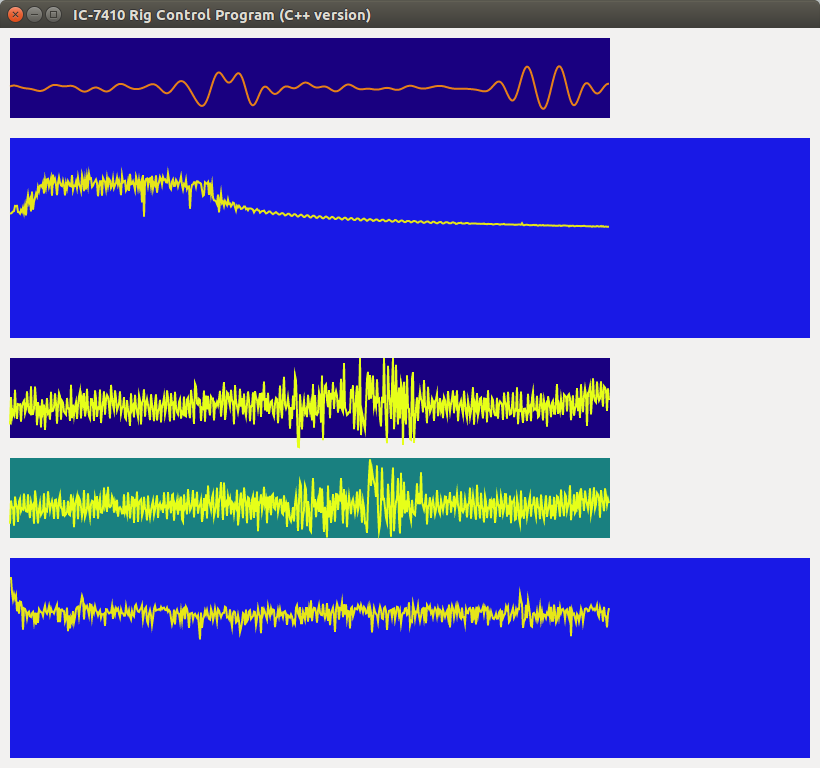Added fft windows. (No waterfall windows yet.)
It seems that the code looks much better now, I mean more C++ like.
//============================================================================
// Name : Rig008.cpp
//============================================================================
#include "SoundIC7410.h"
#include "SoundSoft66.h"
#include "MyDrawingArea.h"
#include <gtkmm.h>
#include <vector>
#include <iostream>
using namespace std;
int main(int argc, char *argv[]) {
if (argc != 3) {
cout << "Usage example: " << argv[0] << " hw:2,0 hw:1,0 " << endl;
return 1;
}
vector <Sound*> soundlist;
soundlist.push_back( new SoundIC7410{argv[1]} );
soundlist.push_back( new SoundSoft66{argv[2]} );
argc = 1; /* just for the next line */
Glib::RefPtr < Gtk::Application > app = Gtk::Application::create(argc, argv, "org.gtkmm.example");
Gtk::Window mywindow;
Gtk::VBox mybox;
mywindow.set_title("IC-7410 Rig Control Program (C++ version)");
for(auto s : soundlist) {
mybox.pack_start( *(new MyDrawingArea{s}), FALSE, FALSE, 0 );
}
mywindow.add(mybox);
mywindow.show_all();
return app->run(mywindow);
}
We have two different types of sound devices (see lines 20-21), IC7410 (I channel only) and Soft66 (I and Q channels).
But in the for loop (see lines 30-32), we just use a pointer s to the base class Sound, which is an abstract class with pure virtual functions.
/* Sound.h */
#ifndef SOUND_H_
#define SOUND_H_
#include "AlsaParams.h"
#include <asoundlib.h>
class Sound : public AlsaParams {
public:
Sound();
virtual int get_channels() const = 0;
virtual int asound_fftcopy() = 0;
virtual ~Sound();
};
#endif /* SOUND_H_ */
The functions in the two derived classes, SoundIC7410 and SoundSoft66, override these virtual functions so that the different characteristics of the devices are treated properly.
/* SoundIC7410.h */
#ifndef SOUNDIC7410_H_
#define SOUNDIC7410_H_
#include "AlsaParams.h"
#include "Sound.h"
class SoundIC7410: public Sound {
public:
SoundIC7410();
SoundIC7410(char *s);
int get_channels() const override { return 1; }
int asound_fftcopy() override;
virtual ~SoundIC7410();
};
#endif /* SOUNDIC7410_H_ */
/* SoundIC7410.cpp */
#include "SoundIC7410.h"
#include <iostream>
using namespace std;
SoundIC7410::SoundIC7410() {
}
SoundIC7410::SoundIC7410(char* s) {
sound_device = s;
channels = 1;
rate = 32000;
buffer_size = 32 * 1024;
period_size = 8 * 1024;
nfft = 4 * 1024; /* IC-7410 */
samples = new signed short[period_size * channels * 2];
audio_signal = new double [period_size * channels * 2];
audio_signal_ffted = new double [nfft];
in_real = new double[nfft];
out = (fftw_complex *) fftw_malloc(sizeof(fftw_complex) * ( nfft/2 + 1 )*2 );
plan = fftw_plan_dft_r2c_1d(nfft, in_real, out, FFTW_MEASURE);
asound_init();
asound_go();
}
int SoundIC7410::asound_fftcopy() {
for (int i = 0; i < nfft; i++) {
in_real[i] = audio_signal[i];
}
return 0;
}
SoundIC7410::~SoundIC7410() {
}
The important part is that there are no if nor switch statements to take care of the different types of devices.

